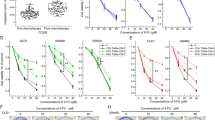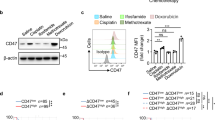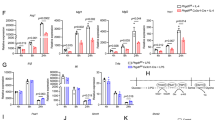Abstract
Resistance to pharmacologic agents used in chemotherapy is common in most human carcinomas, including pancreatic ductal adenocarcinoma (PDA), which is resistant to almost all drugs, including gemcitabine, a nucleoside analog used as a first-line treatment. Poor survival rates of PDA patients have, therefore, not changed much over 4 decades. Recent data indicated that tumor-associated macrophages (TAMs), which are abundant in the microenvironment of several tumors, including PDA, secrete pro-tumorigenic factors that contribute to cancer progression and dissemination. In this study, we show for the first time that TAMs can also induce chemoresistance of PDA by reducing gemcitabine-induced apoptosis. Macrophages co-cultured with cancer cells or TAM-conditioned medium significantly reduced apoptosis and activation of the caspase-3 pathway during gemcitabine treatment. In vivo PDA models of mice, which have reduced macrophage recruitment and activation, demonstrated improved response to gemcitabine compared with controls. Similarly, inhibition of monocytes/macrophages trafficking by a CSF1-receptor antagonist GW2580 augmented the effect of gemcitabine in a transgenic mouse PDA model that was resistant to gemcitabine alone. Analysis of multiple proteins involved in gemcitabine delivery and metabolism revealed that TAMs induced upregulation of cytidine deaminase (CDA), the enzyme that metabolizes the drug following its transport into the cell. Decreasing CDA expression by PDA cells blocked the protective effect of TAMs against gemcitabine. These results provide the first evidence of a paracrine effect of TAMs, which mediates acquired resistance of cancer cells to chemotherapy. Modulation of macrophage trafficking or inhibition of CDA may offer a new strategy for augmenting the response of PDA to chemotherapy.
This is a preview of subscription content, access via your institution
Access options
Subscribe to this journal
Receive 50 print issues and online access
$259.00 per year
only $5.18 per issue
Buy this article
- Purchase on Springer Link
- Instant access to full article PDF
Prices may be subject to local taxes which are calculated during checkout






Similar content being viewed by others
References
Colucci G, Labianca R, Di Costanzo F, Gebbia V, Carteni G, Massidda B et al. Randomized phase III trial of gemcitabine plus cisplatin compared with single-agent gemcitabine as first-line treatment of patients with advanced pancreatic cancer: the GIP-1 study. J Clin Oncol 2010; 28: 1645–1651.
Cunningham D, Chau I, Stocken DD, Valle JW, Smith D, Steward W et al. Phase III randomized comparison of gemcitabine versus gemcitabine plus capecitabine in patients with advanced pancreatic cancer. J Clin Oncol 2009; 27: 5513–5518.
Tempero M, Plunkett W, Ruiz Van Haperen V, Hainsworth J, Hochster H, Lenzi R et al. Randomized phase II comparison of dose-intense gemcitabine: thirty-minute infusion and fixed dose rate infusion in patients with pancreatic adenocarcinoma. J Clin Oncol 2003; 21: 3402–3408.
Loehrer PJ Sr, Feng Y, Cardenes H, Wagner L, Brell JM, Cella D et al. Gemcitabine alone versus gemcitabine plus radiotherapy in patients with locally advanced pancreatic cancer: an Eastern Cooperative Oncology Group trial. J Clin Oncol 2011; 29: 4105–4112.
Giovannetti E, Mey V, Nannizzi S, Pasqualetti G, Del Tacca M, Danesi R . Pharmacogenetics of anticancer drug sensitivity in pancreatic cancer. Mol Cancer Therap 2006; 5: 1387–1395.
Summy JM, Trevino JG, Baker CH, Gallick GE . c-Src regulates constitutive and EGF-mediated VEGF expression in pancreatic tumor cells through activation of phosphatidyl inositol-3 kinase and p38 MAPK. Pancreas 2005; 31: 263–274.
Greten FR, Weber CK, Greten TF, Schneider G, Wagner M, Adler G et al. Stat3 and NF-kappaB activation prevents apoptosis in pancreatic carcinogenesis. Gastroenterology 2002; 123: 2052–2063.
Korc M . Pancreatic cancer-associated stroma production. Am J Surg 2007; 194 (Suppl 4): S84–S86.
Andre F, Berrada N, Desmedt C . Implication of tumor microenvironment in the resistance to chemotherapy in breast cancer patients. Curr Opin Oncol 2010; 22: 547–551.
Ricci F, Kern SE, Hruban RH, Iacobuzio-Donahue CA . Stromal responses to carcinomas of the pancreas: juxtatumoral gene expression conforms to the infiltrating pattern and not the biologic subtype. Cancer Biol Ther 2005; 4: 302–307.
Mantovani A, Sica A . Macrophages, innate immunity and cancer: balance, tolerance, and diversity. Curr Opin Immunol 2010; 22: 231–237.
Esposito I, Menicagli M, Funel N, Bergmann F, Boggi U, Mosca F et al. Inflammatory cells contribute to the generation of an angiogenic phenotype in pancreatic ductal adenocarcinoma. J Clin Pathol 2004; 57: 630–636.
Jinushi M, Chiba S, Yoshiyama H, Masutomi K, Kinoshita I, Dosaka-Akita H et al. Tumor-associated macrophages regulate tumorigenicity and anticancer drug responses of cancer stem/initiating cells. Proc Natl Acad Sci USA 2011; 108: 12425–12430.
Joyce JA, Pollard JW . Microenvironmental regulation of metastasis. Nat Rev Cancer 2009; 9: 239–252.
Gil Z, Cavel O, Kelly K, Brader P, Rein A, Gao SP et al. Paracrine regulation of pancreatic cancer cell invasion by peripheral nerves. J Natl Cancer Inst 2010; 102: 107–118.
Cavel O, Shomron O, Shabtay A, Vital J, Trejo-Leider L, Weizman N et al. Endoneurial macrophages induce perineural invasion of pancreatic cancer cells by secretion of GDNF and activation of RET tyrosine kinase receptor. Cancer Res 2012; 72: 5733–5743.
Nefedova Y, Landowski TH, Dalton WS . Bone marrow stromal-derived soluble factors and direct cell contact contribute to de novo drug resistance of myeloma cells by distinct mechanisms. Leukemia 2003; 17: 1175–1182.
Zheng Y, Cai Z, Wang S, Zhang X, Qian J, Hong S et al. Macrophages are an abundant component of myeloma microenvironment and protect myeloma cells from chemotherapy drug-induced apoptosis. Blood 2009; 114: 3625–3628.
Staroselsky AN, Fan D, O’Brian CA, Bucana CD, Gupta KP, Fidler IJ . Site-dependent differences in response of the UV-2237 murine fibrosarcoma to systemic therapy with adriamycin. Cancer Res 1990; 50: 7775–7780.
Meads MB, Hazlehurst LA, Dalton WS . The bone marrow microenvironment as a tumor sanctuary and contributor to drug resistance. Clin Cancer Res 2008; 14: 2519–2526.
Condeelis J, Pollard JW . Macrophages: obligate partners for tumor cell migration, invasion, and metastasis. Cell 2006; 124: 263–266.
De Palma M, Lewis CE . Cancer: Macrophages limit chemotherapy. Nature 2011; 472: 303–304.
Mitchem JB, Brennan DJ, Knolhoff BL, Belt BA, Zhu Y, Sanford DE et al. Targeting tumor-infiltrating macrophages decreases tumor-initiating cells, relieves immunosuppression, and improves chemotherapeutic responses. Cancer Res 2013; 73: 1128–1141.
Ferrandina G, Ludovisi M, Lorusso D, Pignata S, Breda E, Savarese A et al. Phase III trial of gemcitabine compared with pegylated liposomal doxorubicin in progressive or recurrent ovarian cancer. J Clin Oncol 2008; 26: 890–896.
Morgan MA, Parsels LA, Parsels JD, Mesiwala AK, Maybaum J, Lawrence TS . Role of checkpoint kinase 1 in preventing premature mitosis in response to gemcitabine. Cancer Res 2005; 65: 6835–6842.
Schafer H, Struck B, Feldmann EM, Bergmann F, Grage-Griebenow E, Geismann C et al. TGF-beta1-dependent L1CAM expression has an essential role in macrophage-induced apoptosis resistance and cell migration of human intestinal epithelial cells. Oncogene 2013; 32: 180–189.
Clark CE, Hingorani SR, Mick R, Combs C, Tuveson DA, Vonderheide RH . Dynamics of the immune reaction to pancreatic cancer from inception to invasion. Cancer Res 2007; 67: 9518–9527.
Zhang J, Lu Y, Pienta KJ . Multiple roles of chemokine (C-C motif) ligand 2 in promoting prostate cancer growth. J Natl Cancer Inst 2010; 102: 522–528.
Pahler JC, Tazzyman S, Erez N, Chen YY, Murdoch C, Nozawa H et al. Plasticity in tumor-promoting inflammation: impairment of macrophage recruitment evokes a compensatory neutrophil response. Neoplasia 2008; 10: 329–340.
Niedergethmann M, Alves F, Neff JK, Heidrich B, Aramin N, Li L et al. Gene expression profiling of liver metastases and tumour invasion in pancreatic cancer using an orthotopic SCID mouse model. Br J Cancer 2007; 97: 1432–1440.
Olive KP, Jacobetz MA, Davidson CJ, Gopinathan A, McIntyre D, Honess D et al. Inhibition of Hedgehog signaling enhances delivery of chemotherapy in a mouse model of pancreatic cancer. Science 2009; 324: 1457–1461.
van Rooijen N, van Kesteren-Hendrikx E . ‘In vivo’ depletion of macrophages by liposome-mediated ‘suicide’. Methods Enzymol 2003; 373: 3–16.
Steube KG, Meyer C, Drexler HG . Secretion of functional hematopoietic growth factors by human carcinoma cell lines. Int J Cancer 1998; 78: 120–124.
Green CE, Liu T, Montel V, Hsiao G, Lester RD, Subramaniam S et al. Chemoattractant signaling between tumor cells and macrophages regulates cancer cell migration, metastasis and neovascularization. PLoS ONE 2009; 4: e6713.
Hingorani SR, Wang L, Multani AS, Combs C, Deramaudt TB, Hruban RH et al. Trp53R172H and KrasG12D cooperate to promote chromosomal instability and widely metastatic pancreatic ductal adenocarcinoma in mice. Cancer Cell 2005; 7: 469–483.
Bhutia YD, Hung SW, Patel B, Lovin D, Govindarajan R . CNT1 expression influences proliferation and chemosensitivity in drug-resistant pancreatic cancer cells. Cancer Res 2011; 71: 1825–1835.
Akita H, Zheng Z, Takeda Y, Kim C, Kittaka N, Kobayashi S et al. Significance of RRM1 and ERCC1 expression in resectable pancreatic adenocarcinoma. Oncogene 2009; 28: 2903–2909.
Burris HA 3rd, Moore MJ, Andersen J, Green MR, Rothenberg ML, Modiano MR et al. Improvements in survival and clinical benefit with gemcitabine as first-line therapy for patients with advanced pancreas cancer: a randomized trial. J Clin Oncol 1997; 15: 2403–2413.
Gilbert LA, Hemann MT . Chemotherapeutic resistance: surviving stressful situations. Cancer Res 2011; 71: 5062–5066.
Straussman R, Morikawa T, Shee K, Barzily-Rokni M, Qian ZR, Du J et al. Tumour micro-environment elicits innate resistance to RAF inhibitors through HGF secretion. Nature 2012; 487: 500–504.
Yamashina K, Miller BE, Heppner GH . Macrophage-mediated induction of drug-resistant variants in a mouse mammary tumor cell line. Cancer Res 1986; 46: 2396–2401.
DeNardo DG, Brennan DJ, Rexhepaj E, Ruffell B, Shiao SL, Madden SF et al. Leukocyte complexity predicts breast cancer survival and functionally regulates response to chemotherapy. Cancer discovery 2011; 1: 54–67.
Shree T, Olson OC, Elie BT, Kester JC, Garfall AL, Simpson K et al. Macrophages and cathepsin proteases blunt chemotherapeutic response in breast cancer. Genes Dev 2011; 25: 2465–2479.
Ahn GO, Tseng D, Liao CH, Dorie MJ, Czechowicz A, Brown JM . Inhibition of Mac-1 (CD11b/CD18) enhances tumor response to radiation by reducing myeloid cell recruitment. Proc Natl Acad Sci USA 2010; 107: 8363–8368.
Kozin SV, Kamoun WS, Huang Y, Dawson MR, Jain RK, Duda DG . Recruitment of myeloid but not endothelial precursor cells facilitates tumor regrowth after local irradiation. Cancer Res 2010; 70: 5679–5685.
Vakkila J, Lotze MT . Inflammation and necrosis promote tumour growth. Nat Rev Immunol 2004; 4: 641–648.
Dijkgraaf EM, Heusinkveld M, Tummers B, Vogelpoel LT, Goedemans R, Jha V et al. Chemotherapy alters monocyte differentiation to favor generation of cancer-supporting M2 macrophages in the tumor microenvironment. Cancer Res 2013; 73: 2480–2492.
Singh S, Srivastava SK, Bhardwaj A, Owen LB, Singh AP . CXCL12-CXCR4 signalling axis confers gemcitabine resistance to pancreatic cancer cells: a novel target for therapy. Br J Cancer 2010; 103: 1671–1679.
Wilson TR, Fridlyand J, Yan Y, Penuel E, Burton L, Chan E et al. Widespread potential for growth-factor-driven resistance to anticancer kinase inhibitors. Nature 2012; 487: 505–509.
Acknowledgements
Esther Eshkol is thanked for editorial assistance. This research was supported by the Legacy Heritage Biomedical Science Partnership Program of the Israel Science Foundation, the Israel Cancer Association (grant donated by Ellen and Emanuel Kronitz in memory of Dr Leon Kronitz), the Israeli Ministry of Health (No. 3-7355), the Rambam Medical Center Intramural Grant, the ICRF Barbara S Goodman endowed research career development award in Pancreatic Cancer (2011-601-BGPC) all to ZG, and the US-Israel Binational Science Foundation to ZG and RJW.
Author information
Authors and Affiliations
Corresponding author
Ethics declarations
Competing interests
The authors declare no conflict of interest.
Additional information
Supplementary Information accompanies this paper on the Oncogene website
Rights and permissions
About this article
Cite this article
Weizman, N., Krelin, Y., Shabtay-Orbach, A. et al. Macrophages mediate gemcitabine resistance of pancreatic adenocarcinoma by upregulating cytidine deaminase. Oncogene 33, 3812–3819 (2014). https://doi.org/10.1038/onc.2013.357
Received:
Revised:
Accepted:
Published:
Issue Date:
DOI: https://doi.org/10.1038/onc.2013.357
Keywords
This article is cited by
-
Epithelial and stromal co-evolution and complicity in pancreatic cancer
Nature Reviews Cancer (2023)
-
A role for macrophages under cytokine control in mediating resistance to ADI-PEG20 (pegargiminase) in ASS1-deficient mesothelioma
Pharmacological Reports (2023)
-
Multicellular tumor spheroid model to study the multifaceted role of tumor-associated macrophages in PDAC
Drug Delivery and Translational Research (2023)
-
Development of doped ZnO-based biomimicking and tumor-targeted nanotheranostics to improve pancreatic cancer treatment
Cancer Nanotechnology (2022)
-
Macrophages-aPKCɩ-CCL5 Feedback Loop Modulates the Progression and Chemoresistance in Cholangiocarcinoma
Journal of Experimental & Clinical Cancer Research (2022)



